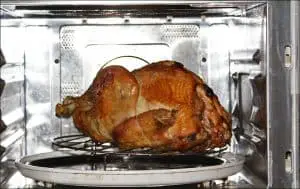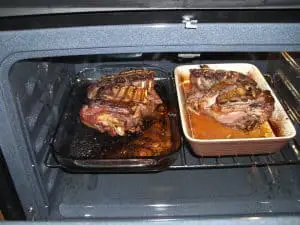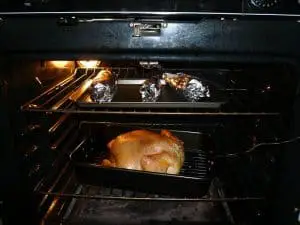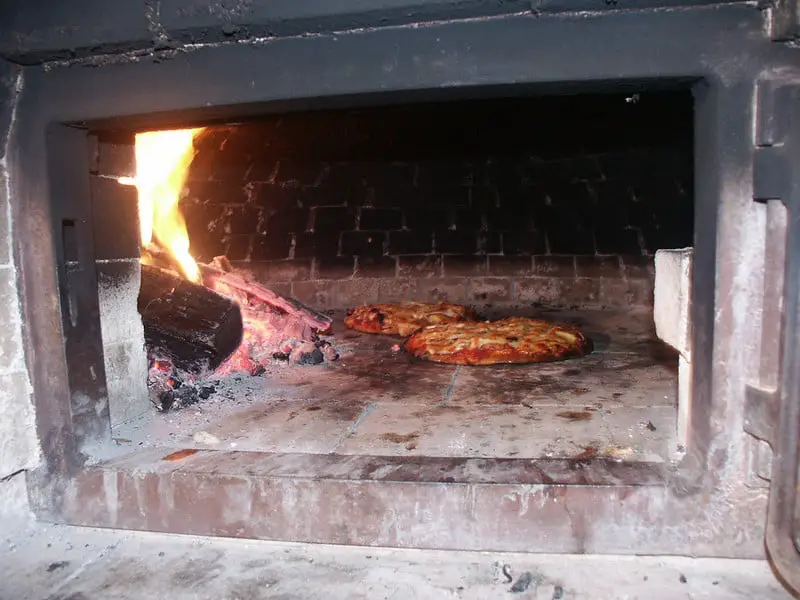You probably bumped into an exciting recipe that required you to leave some tender ribs wrapped in a foil in your oven at 180 degrees Fahrenheit for 9 hours.
But because you thought leaving them simmering overnight would be a bad idea, you decided to embark on this exercise in the morning so that they could be ready by afternoon.
All this was to commence after you had returned from checking on an acquaintance in the next neighborhood.
But, Is It Safe To Leave Your Oven On And Unattended When You’re Not Home?
Yes, if it is electric; no if it’s a gas-powered oven. However, you can compromise a bit especially if your oven has the auto-shut-off feature (more on this later). Still, plenty of other factors can come into play, like the ventilation status of your home.
Let’s get deeper into this:
NO for gas ovens

Gas ovens are riskier to leave unattended than electric ovens.
Why?
Your gas-powered oven never burns each jet of gas completely. If it burned the gas entirely, the constituent hydrocarbons would dissociate completely into carbon dioxide (a not-so-dangerous gas that plants love and which your body can handle easily) and water.
However, incomplete burning hinders the formation of carbon dioxide in favor of carbon monoxide.
Forget the chemistry part of this whole affair, carbon monoxide is a poisonous gas that shouldn’t be inhaled at all costs.
The worst thing is that you don’t even notice the exposure (because it is odorless and colorless) until you start exhibiting the symptoms of CO poisoning.
Unfortunate victims have reported these symptoms:
- General weakness
- Headaches
- Dizziness
- Nausea
- Shortness of breath
- Loss of consciousness
- Confusion
- Blurred Vision
These can resemble a bad case of flu, can’t they?
You don’t want to leave your oven running with a kid or an adult sleeping at home – they may wake up with serious CO poisoning. Chances of CO poisoning can increase remarkably if the home is poorly ventilated.
Also, if you don’t have a Carbon Monoxide detector readily installed, you won’t be able to get the warning when the gas builds up to life-threatening levels.
Besides Carbon Monoxide poisoning, an unattended gas-powered oven could easily overheat and start a fire.
The oven itself may not necessarily catch fire all by itself as long as there is nothing in the chamber TO be ignited.
Also, the chances of a fire can be reduced significantly by ensuring the door of the oven is closed properly.
If a pan of fatty food, crumbs of food, or grease are left inside the chamber then chances of a fire outbreak would be higher.
As aforementioned, if the door of the oven is left open or does not close completely, the heat can melt the knobs or any external add-ons and could possibly start a fire.
YES for Electric Ovens (with caution)

Electric ovens can be (although we honestly don’t recommend it) left to run for a long time unattended.
Note that some ovens are designed to shut themselves automatically after some time, you will need to deactivate that feature if you plan to cook past the threshold period.
Most ovens and the accompanying ranges with touchpad clock controls are designed to automatically shut down after 12 hours of continuous operation.
This has two benefits:
- energy saving
- and peace-of-mind if you accidentally leave the oven on.
Models without a timer or clock may not feature automatic shutdown
If the electric oven lets you set definite operation periods, then you can bet on it to stop cooking after a given period even when you are not around.
The fact that electric ovens don’t use burnable fuels removes the risk of carbon monoxide.
So, can you leave an electric oven running for a long time?
In two words – “it depends.”
The truth here is that leaving your electric oven does not, of and in itself pose a risk to the safety of your home except the food.
If the food ends up overcooked in your absence, that would be it!
Also, if there’s something on the cooktop or close to the burner that can catch fire, the chances of razing down the home increases twofold.
The Temperature Factor

The temperature of operation too has an influence on whether you can leave the oven running for a long time.
Under most cooking circumstances, probably yes. However, the higher the temperature, the riskier it is to leave the oven to run unattended.
Normally, an electric or gas-powered oven installed perfectly according to all required regulations, running at about low temperature (say 212 degrees Fahrenheit or so) can run safely and unattended without incidence for a very long time.
Such an oven can even run for days or weeks unchecked.
However, there is always a chance of something going awry with an increasing period of unattended operation regardless of the temperature.
What if your pot runs out of water when everything was going on smoothly?
Let’s say the oven is old or experiences some malfunctions and ends getting unreasonably hot somewhere along the way, what’s the worst that could occur?
So basically, 2 factors are involved:
- The quality of your food
- The safety of the home
Food Quality
Looking at the whole situation from a palatability perspective, it won’t be a great idea to leave food in an active place often for an extended period.
You may get some not-so-impressive results depending on the internal temperature of your choosing.
180 degrees Fahrenheit, for example, is close to the temperature needed to effectively convert the gelatin component of the ribs into collagen and form the tender enjoyable texture out of a tough slab of ribs.
If the temperatures inside the ribs fail to rise that high, and air is known to be a bad transmitter of heat (that’s why you can easily stick your bare hand in a 500 degree Fahrenheit oven at times), the ribs may not cook properly no matter how long you let it stay in there.
Home Safety
The agency recommends not leaving your cooking appliances unattended or with kids.
Related: Is It Better To Have A Double Oven Or Two Single Ovens?
In a nutshell
So, is it safe to leave your oven on when you’re not home?
It depends on the type of the fuel/source of energy –
- yes if the oven is electric;
- no if it’s gas-powered.
However, you can compromise a bit especially if your oven has the auto-shut-off feature.
Still, plenty of other factors can come into play, like the ventilation status of your home.
NO for the gas oven; gas ovens are riskier to leave unattended than electric ovens.
- Your gas-powered oven never burns each jet of gas completely and often produces Carbon monoxide (CO) gas – a colorless, odorless, and dangerous gas produced by incomplete burning
- Carbon Monoxide is a poisonous gas that shouldn’t be inhaled at all cost
- The worst thing is that you don’t even notice the exposure (because it is odorless and colorless) until you start exhibiting the symptoms of CO poisoning.
- Chances of CO poisoning can increase remarkably if the home is poorly ventilated
- Also, if you don’t have a Carbon Monoxide detector readily installed, you won’t be able to get the warning when the gas builds up to life-threatening levels
- Besides Carbon Monoxide poisoning, an unattended gas-powered oven could easily overheat and start a fire.
- The oven itself may not necessarily catch fire all by itself as long as there is nothing in the chamber to be ignited.
- The chances of a fire can be reduced significantly by ensuring the door of the oven is closed properly.
- If a pan of fatty food, crumbs of food, or grease are left inside the chamber then chances of a fire outbreak would be higher.
- If the door of the oven is left open or does not close completely, the heat can melt the knobs or any external add-ons and could possibly start a fireYES for an Electric Stove (with caution); electric ovens can be (although we honestly don’t recommend it) left to run for a long time unattended
- Some ovens are designed to shut themselves automatically after some time, you will need to deactivate that feature if you plan to cook past the threshold period.
- The fact that electric ovens don’t use burnable fuels removes the risk of carbon monoxide
- The temperature of operation too has an influence on whether you can leave the oven running for a long time.
- Under most cooking circumstances, probably yes.
- However, the higher the temperature, the riskier it is to leave the oven to run unattended.
- Usually, an electric or gas-powered oven installed perfectly according to all required regulations, running at about low temperature (say 212 degrees Fahrenheit or so) can run safely and unattended without incidence for a very long time
- However, there is always a chance of something going awry with an increasing period of unattended operation regardless of the temperature.

